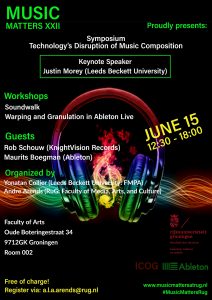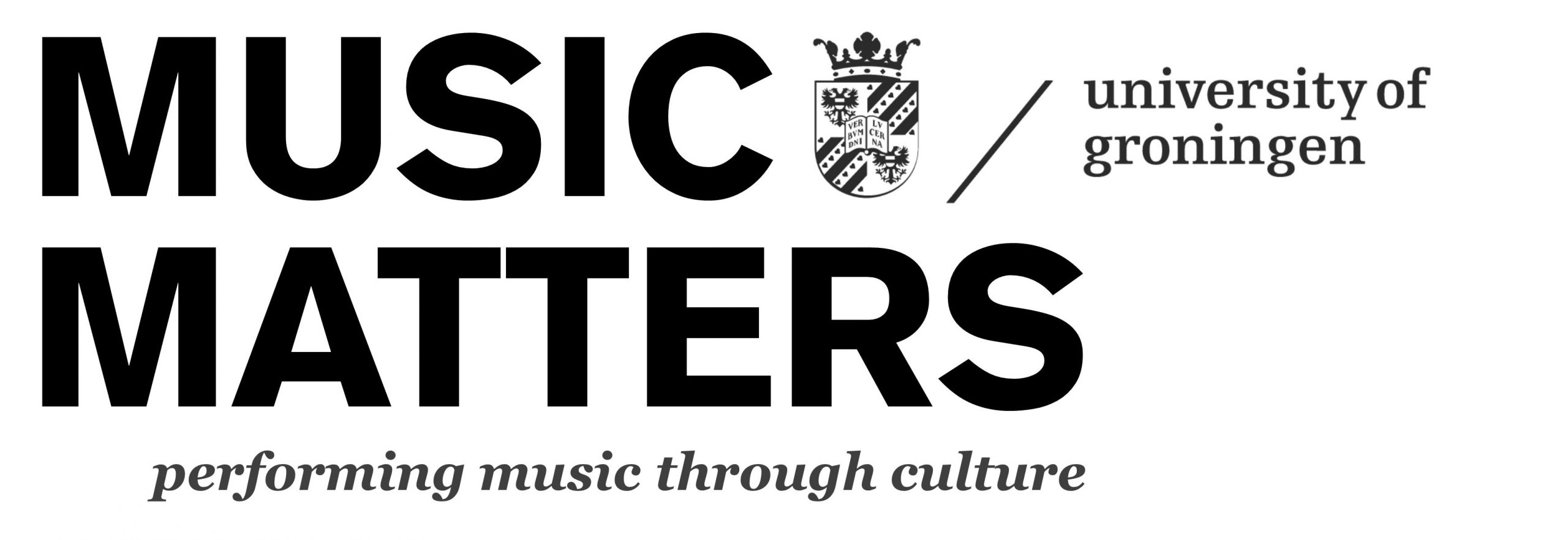 The Department of Arts, Culture and Media and ICOG invites you to the fourth Music Matters XXII Concert and Lecture Series of 2018 on Friday June 15th at the “Oude Boteringestraat 34”
The Department of Arts, Culture and Media and ICOG invites you to the fourth Music Matters XXII Concert and Lecture Series of 2018 on Friday June 15th at the “Oude Boteringestraat 34”
At 13:00 we host a symposium on the topic of
“Technology’s Disruption of Music Composition”
Website: www.musicmattersatrug.nl
Time: 12:30 – 18:00
Place. Room 002 (Oude Boteringestraat 34, Faculty of Arts)
Free of admission!
Registration via: a.l.a.arends@rug.nl
“From the piano to the digital audio workstation, the latest technology has always had an influence on the artistic development and creative direction of composers and musicians. Leaps forward in technology have the potential to fundamentally alter the compositional process; to change the very way in which composers think about the music they are creating.
Similarly, changes in technology have shaped the development of the music industry from its inception. The arrival of new formats – sheet music, vinyl, CDs, MP3s, streaming – can lead to the creation of new power structures, as well as variously entrenching or destroying those that pre-existed.
Over a half-day program of events, the symposium will explore the ways in which recent technological advancements have disrupted both contemporary compositional processes, and the wider music industry. These ideas will be explored through a series of talks, panels and practical demonstrations.”
ORGANIZED BY
Yonatan Collier (Leeds Beckett University: FMPA)
Andre Arends (RuG: Faculty of Arts, Media and Culture)
“Today’s digital music is the result of a two-way relationship between hardware/software and the producer (mis)using it; at least this is the rhetoric of countless digital sound artists.[…] The stutter of malfunction has become part of an established musical language.” (Janne van Hanen)
“The Digital Revolution is over”, argued Nicholas Negroponte in 1998. A bold statement, as the real tsunami of electronic dance music was yet to come. The latest technology has always had an influence on the artistic development and creative direction of composers and musicians; the piano forte, the organ, the valve trumpet and horn, electric amplified instruments, synthesizers, and more recently invented musical interfaces like MIDI controllers and Gloves.
Is the digital revolution over? If so, what are the implications for creativity and artistry in the digital realm? And what directions will music and sound design take in the post-digital age?
PROGRAM
12.30 Registration [OBS Room 002]
13.00 Keynote Speaker – Justin Morey (Leeds Beckett University) [OBS Room 002]
Justin Morey: ‘UK Sampling Composers, their Creative Practice, and the Implications of Copyright Management for Producers and Consumers’
13.45 Changes Within the Music Industries – Discussion with Rob Schouw [OBS Room 002]
Discussion with Rob Schouw, former Managing Director of Sony Music; moderated by Dr. Kristin McGee (University of Groningen).
How has technology disrupted the music industry from both the artistic and industrial perspective? Rob Schouw will provide insight into the organization and business of Spotify such as how metadata are involved in playlists, rankings of artists, and the number of downloads and streams by users.
14.15 Coffee Break
14.30 Workshop I and II
Workshop I: Introductions by Yonatan Collier (interactive soundwalk)
Wokrshop II: Andre Arends (voice sampling and Ableton Live) [OBS 112]
15.30 Break
15:45 – 16:30 Panel Discussion on Technologies Disruption of the Music Industry
Moderated by Chris Tonelli (RUG). Panelists: Justin Morey (Leeds Beckett University), Rob Schouw (Knight Vision Records), Andre Arends (RUG) and Yoni Collier (Leeds Beckett University).
16:45 Borrel
WORKSHOP I – Interactive Soundwalk
Workshop by Yonatan Collier PhD candidate School of Film, Music and Performance Leeds Beckett University. At the symposium Yonatan will be premiering one of his immersive musical pieces in a participatory workshop. Symposium attendees will have the opportunity to explore a composition that has been mapped over the streets of Groningen. Yonatan will introduce his research project, before inviting participants to experience the piece. To take part, please bring a Smartphone and headphones.
WORKSHOP II – The Deconstructed Voice
André Arends examines voice sampling and the deconstruction of speech. He reveals the interplay between the semantic and sonic meaning of speech.
Ableton Benelux provides laptops and PUSH’s with which participants can try out the software during this workshop.
Keynote Abstract
In terms of UK dance music, the years 1987-1991 represented a point of convergence where social change, technological developments and new approaches to music making combined to create distinctive and diverse styles and genres, reaching from the underground to the top of the pop charts. Central to this was the emergence of affordable digital sampling tools, the use of which led to distinctive forms of compositional and production practice, and which arguably created a paradigm shift in the meaning of both “composition” and “composer”.
Using qualitative data gathered from UK sampling composers, this presentation firstly considers some of the distinct musical practices derived from using samples and samplers, and subsequently, how sampling composers have sought to maintain a sampling aesthetic in their work when the increasing costs of using and clearing phonographic samples have become prohibitive.
GUESTS
Justin Morey (Leeds Beckett University, UK)
Justin Morey has more than ten years’ experience as an independent studio owner, engineer and producer. His research interests include digital sampling, copyright, and creative practice in music production.
Justin set up and ran a recording studio in Shoreditch, East London from 1995 until 2003 when he relocated the studio to Sheffield. He worked as an engineer, programmer and producer for clients including Kathy Brown, Daisy Chainsaw, EMI Music Publishing, Flextech Television, Simon Napier-Bell, New Horizons, Pay As You Go, Pepe Deluxe, Sonic Boom, VNV Nation, Wiley and ZTT, as well as being a signed artist himself.
Since 2001 he has taught courses on music production and music technology at Community Music, London, Confetti Studios, Nottingham, Red Tape Studios, Sheffield and Leeds College of Music. Since 2004, he has held the position of Senior Lecturer at Leeds Beckett University, where his expertise lies in the music business, studio-based recording and production, and production analysis.
Maurits Boegman (Ableton, Berlin)
Maurits Boegman works as a Product Specialist for Ableton. He gives workshops, training sessions and masterclasses. He also organizes and executes large-scale events like Dancefair and Amsterdam Dance Event (ADE). Because he’s in close contact with Ableton HQ in Berlin, he’s involved with the many facets of music production, a subject of which he brings into his lectures on music making, education, and technology. Ableton was founded in 1999 and released the first version of Live in 2001. Their products are used by a community of dedicated musicians, sound designers, and artists from across the world.
Ableton
The driving force behind Ableton is the passion for what they make, and the people for whom they make it. Ableton comprises more than 270 people from 30 different countries divided between their headquarters in Berlin and offices in Los Angeles and Tokyo. Most employees are active musicians, producers, and DJs, and many use Live and Push every day. They represent a wide range of cultural and professional backgrounds. Some have PhDs, some are self-taught, and most are somewhere in between. What connects those working with and for Ableton is the shared belief that each of us has the skills and knowledge to contribute to something big: helping to shape the future of music culture.
Rob Schouw (Sony Music, Knight Vision Records)
Rob Schouw spent more than 25 years of his career in the music business. He began as a marketing manager for Warner Music Group in the early nineties. He then became managing director of the BMG music group in 2000 and Sony CEO in 2004 for the Benelux region. Over the years he has been a driving force behind the breakthrough of many international artists including Alicia Keys, Pink, Usher, REM, Red Hot Chili Peppers, Green Day and local artists including Kane, Niels Geusebroek, K3, and Within Temptation. After leaving Sony Music as CEO he started a full rights management company in 2007, developing Dutch artists like Kyteman, Nobody Beats The Drum and Anneke van Giersbergen (former leadsinger of The Gathering).
In 2016, Rob was co-founder of a new music venture, KnightVision records. KnightVision is an Amsterdam based music company which includes recording, production arms, songwriting, publishing and artist development. From the start in 2016, KnightVision developed a complete focus on the unprecedented opportunities of global streaming for electronic dance music. In short: “Knightvision has a unique combination between an in-house producers team, and a major label powered platform to push their songs into the international market…One of our goals is to keep offering simple and flexible deals to artists, producers and writers, to make sure they will keep the freedom to work with the partners they want.”
Andre Arends (University of Groningen)
André Arends is a professionally trained musician, saxophone player and composer of contemporary (classical) music and electronic music including electronic dance music. He works with Ableton’s Live 10 software. In 2012, he finished his Master’s in Theatre Studies at the University of Amsterdam. He studied the use of pre-recorded voices in Glenn Gould’s radio work The Idea of North. The impact of listening to a disembodied voice in different media has been his main interest.
Since September 2015, he is working on his PhD dissertation at the University of Groningen (Department of Arts, Culture and Media) entitled “Analyzing the Disembodied Voice in Electronic Music: a Post Phenomenological Approach”.
Yonatan Collier (Leeds Beckett University, UK)
Yonatan Collier is currently working towards a practice-based PhD; an examination of how location-based recording, musical performance and production can be used as tools for examining artistic practice, landscape and history. Alongside a written thesis, Yonatan will be composing and producing immersive, interactive musical pieces that will be laid over specific landscapes and ‘performed’ through location-aware Smartphone apps.
